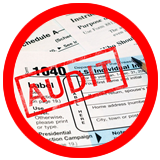 Help With Your Tax Audit
Help With Your Tax Audit
Receiving a notice of tax audit from the IRS can be frightening. An IRS audit is not an accusation of guilt, it simply is the legal process in which the IRS examines a taxpayers personal or business returns to ensure the items were accurately reported. If you have received an IRS audit notice, you should immediately consult a tax professional about your personal or business tax audit. A tax professional can help you better understand your audit, and what you can expect.
What Triggers an IRS Audit?
The IRS only audits between 1 to 2 percent of all tax returns. They claim that they audit the return completely at random, however there are certain items on your return which are red flags for an audit. Below are some of the items the IRS will cause the IRS to audit your personal or business tax returns.
• Very Low Gross Profits
• High vehicle and transportation expenses
• High vehicle use in your business
• More than one vehicle designated for the business
• Travel and Entertainment expenses
• Low profit margins especially if this trend continues for more than a year.
Types of IRS Tax Audits
Correspondence IRS Tax Audit
A correspondence IRS tax audit is done via the mail. The IRS will send you a letter requesting that you send them copies of your receipts, bank statements, and checks in order to verify your expenses. This type of IRS tax audit is usually done for simpler audits, and mostly for personal income tax returns, not business audits.
Office IRS Tax Audit
An IRS office audit notice will come to you via the mail. The Audit letter will tell you which items on your business or personal tax return they are questioning, and what documents they want you to bring to your local IRS tax office so the auditor can examine them.
IRS Tax Field Audit
When you are selected for an IRS field audit, the IRS tax agent will go call the owner/manager/principal at the business and notify them that their tax returns have been chosen for an audit. The audit is called a field audit because the IRS agent will go into the field so to speak and carry out the audit at your residence, or place of business rather than their office.
Taxpayer Compliance Measurement Program IRS Tax Audit
The final type of IRS audit is an audit on every single item of your tax return. The IRS will require that you substantiate each item with the necessary documentation. This means your audit will take a large amount of time away from your business dealing with your audit.
What to Expect From Your Audit
You will receive a notice or call where the agent will request the following from you:
- Schedule an interview with the business owners,
- Set up a time and date to do so at your place of business,
- Find out where your tax documents are located,
- To gather and make available the documentation they request which is needed to substantiate your tax returns.
The Benefit of Hiring Representation for An IRS Tax Audit
The goal of a IRS auditor is to probe you for information, even if it is not needed for the audit. This can cause you to owe more taxes, and will also cause you to spend a large amount of precious time away from your job and business gathering the documents they request, filling out forms, and going to meetings.
- The Schlichting Group has a full time staff of licensed tax professional to help you get through your audit. Here are some of the most important benefits of having proper representation during your IRS audit:
- Limit your high risk, vulnerable, and questionable deductions from the IRS auditor.
- Limit the amount of information provided to your auditor so items which can be interpreted in multiple ways are not given to your auditor. This lowers your risk of further liability and red flags.
- Work with the auditor to only look at large items, and not be “picky” about very small items. Some auditors however will look at each small item, and your representative will be able to take the time make sure no expense or item is unjustly removed or questioned.
- Answer all questions in a prepared, and clear manner to discourage the Auditor from expanding your audit into even more years.
- Handle all communication, scheduling, meetings, paperwork, and forms for your audit.
- Prepare a strategy for getting you through your tax audit in a manner which will minimize your tax liability.
- Save you precious time, so you can concentrate on running your business, going to work, and spending time with your family.
- Appeal an auditors decision if needed, and help you resolve an tax debt which may come out of your audit.
